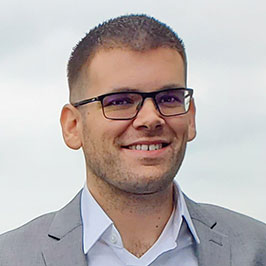Finding a Passion for Entrepreneurship
Ian Wiese (MEM ‘18) reflects on how Northwestern's Master of Engineering Management (MEM) program prepared him for the highs and lows of leading not one, but two startups at the same time.
 Ian Wiese (MEM ‘18) never thought of entrepreneurship as a career path for himself. That was before Northwestern's Master of Engineering Management (MEM) program. Now, three years after graduating, Wiese finds himself in leadership roles for two different startups.
Ian Wiese (MEM ‘18) never thought of entrepreneurship as a career path for himself. That was before Northwestern's Master of Engineering Management (MEM) program. Now, three years after graduating, Wiese finds himself in leadership roles for two different startups.
Wiese is president and chief technology officer (CTO) of Metcovery, where he helps other companies create zero-waste brands by recovering residual metal value from solid waste sources. Wiese is also CTO of NUMiX Materials, a company he co-founded while in MEM focused on water purification.
He recently talked about both jobs and how MEM prepared him for the ups and downs of entrepreneurship.
How do you like to describe your role and responsibilities with Metcovery?
Most succinctly, I would say that I work on business and technology development and implementation. As president of the company, it is my responsibility to ideate, develop, hypothesize, test, and subsequently implement a successful business model. From a technology standpoint, my role is to innovate new products, procedures, methodologies and services to solve customer challenges in novel ways.
How about at NUMiX?
The roles and responsibilities are very similar to those of Metcovery, though, obviously I’m not the CEO of NUMiX, so there’s a tad less pressure. I’m very grateful to have the extremely gifted Katie Kollhoff Mouat (MEM '19) at the helm of the company.
What is it that drew you to entrepreneurship?
I honestly never considered it in my life. During my time in the MEM program, I needed an elective credit and thought Technical Entrepreneurship looked promising. That class had one of the biggest impacts of anything I’ve experienced in my life.
Entrepreneurship lets you as an individual decide what the "right” culture is for your organization and actively grow it along with the company. I have quickly come to believe that innovative individuals can have an exponentially larger and better impact on the world and those around them than someone who is more “cog-in-a-machine.”
What are the biggest challenges you face?
The biggest challenge I think most entrepreneurs face is uncertainty. We as engineers love to believe that our life is a true system with boundaries and that we’re in control. Reality is far more holistic than that and, as it turns out, we only actually control about 5% of what matters. It’s possible to do the right things 100% of the time and still not accomplish the original goal. That’s not failure, it’s growth, but it absolutely can feel like failure.
How did MEM prepare you for what you're doing today?
While I am the sum of all my experiences, MEM had the single largest impact on my life of any experience I’ve had. MEM opened my mind to seeing the world in a more complete way. MEM specifically trains STEM minds to see those tenuous links between concepts, ideas, and systems as essential instead of negligible.
What lessons from the program do you continue to incorporate into your day-to-day work?
Operations ideas from Michael Watson, every single lesson from Don McNeeley and linear programming from Jill Wilson cross my mind almost daily. Really, though, the true lesson that will always stay with me is that if I throw off the chains of rigidity instilled by my engineering background, there is almost no limit to what can be accomplished.
What advice would you give to a prospective MEM student?
- Be as open as possible to new ideas, methods of perception, and experiences, especially those you wouldn’t have considered in the past.
- Give back. The more you seek to help others and foster their growth will exponentially accelerate your own evolution.
- You will get out of MEM what you put into the program, and then some. If you put in 10 times the effort, activity, and aforementioned openness, you’ll get a 100 times return on that investment.
- Learn to be comfortable wallowing in humility. MEM shows you how to see all that you don’t know and that, for me, was incredibly humbling, not to mention uncomfortable. The uncomfortability is a sign that you are growing; embrace it.
Read more about Ian's MEM experience in "Putting My MEM Education to Good Use."

